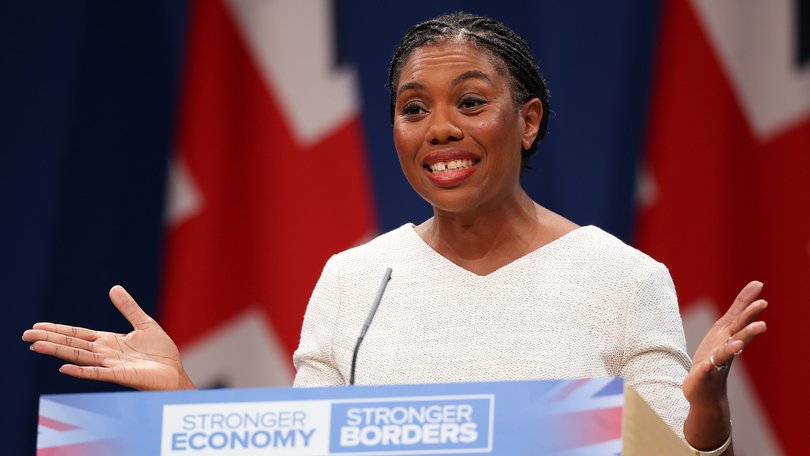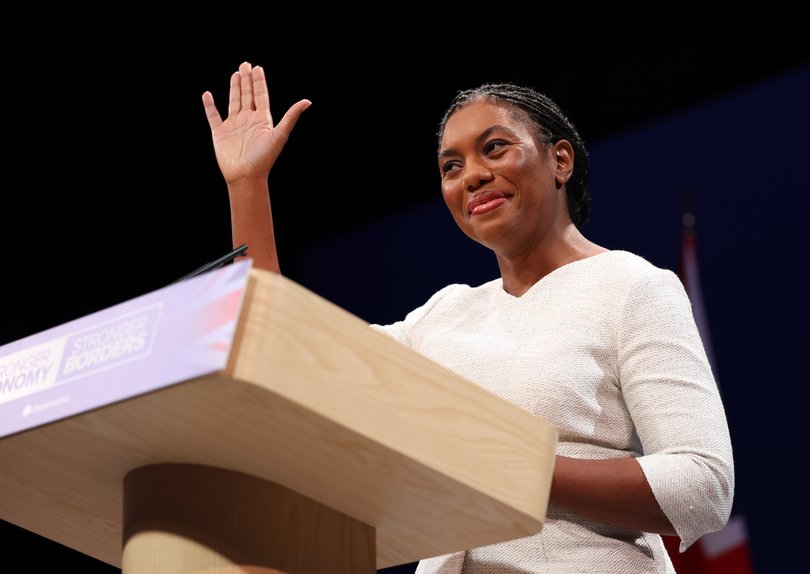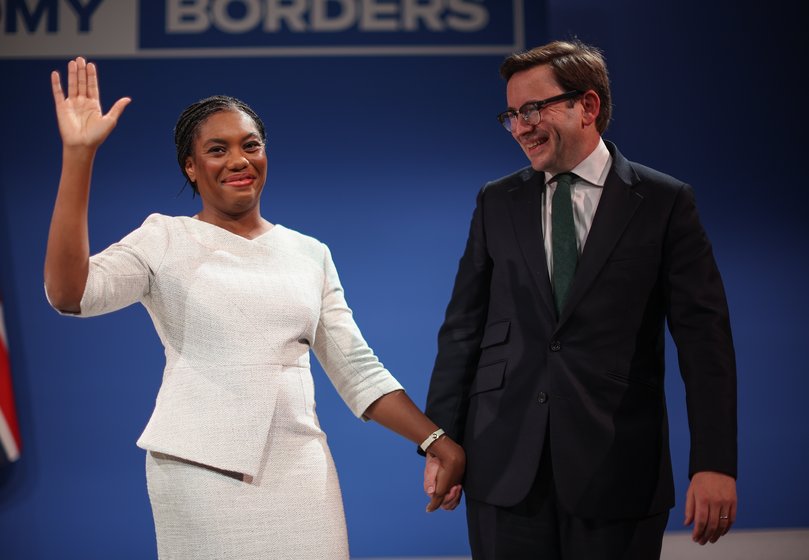Kemi Badenoch’s speech savages Keir Starmer and Nigel Farage, pledges to scrap stamp duty and cut deficit
As Keir Starmer polls as the UK’s most unpopular Prime Minister, Tory Leader Kemi Badenoch has stunned the country with an audacious plan to scrap stamp duty and solve a housing crisis.

Kemi Badenoch hit every single note in her barnstorming speech to the Conservative Party conference in Manchester, successfully savaging both Keir Starmer and Nigel Farage, and repositioning her movement to one focused on tax cutting and fiscal responsibility.
Witty, warm and confident, Ms Badenoch stunned her critics with her performance and attention-grabbing pledge to scrap stamp duty and cut Britain’s deficit through spending cuts.
The UK’s public sector borrowing has risen to record levels — 5.1 per cent of GDP — under Labour. Meanwhile, the economy grew just 1.1 per cent in 2024. Those metrics were the underlying themes of Ms Badenoch’s speech.
Sign up to The Nightly's newsletters.
Get the first look at the digital newspaper, curated daily stories and breaking headlines delivered to your inbox.
By continuing you agree to our Terms and Privacy Policy.She shunned culture war issues and dropped the previous government’s slogan to “stop the boats”, a pledge that has proved impossible and vowed to deliver a “stronger economy” and “stronger borders” instead.
Latching on to the deep sense of malaise and decline that has driven voters into the arms of Nigel Farage’s disrupter Reform party, Ms Badenoch said Brits felt they were stagnating and that “they are living somewhere where things never get any better.”
Keir Starmer is polling as Britain’s most unpopular prime minister following his loveless landslide in July 2024. He won on a slogan of “Change” but set out little in the way of a reform agenda, confident that the imploding Tories would deliver him Number 10.
“They had a plan to win, but no plan for power. No vision for Britain,” Ms Badenoch said.
“They know how to make promises, but not how to deliver them.

“This year, the Prime Minister was asked to name his best moment in office. Do you know what he said? ‘Walking into Downing Street.’
“For once, I agree with him. It’s all been downhill all the way since.”
That drew laughs. But she said that the Conservatives would not win back government by attacking Labour but by offering voters a way out of Britain’s broken model.
“We lost because we accepted the status quo. No more,” she said.
She vowed to reverse Labour’s taxes on education, family farms, ban doctors from striking, stop overly generous benefits for milder mental health conditions such as depression and anxiety, end access to mobility scooters for those with ADHD, cut welfare spending and divert university funding into apprenticeships.
“We are Conservatives, not anarchists. I am an engineer, not an arsonist,” she said.
But the curtain-raiser came when she vowed to end stamp duty. Like in Australia, housing affordability is a major issue, with younger generations locked out of the housing market.
“Scrapping stamp duty will benefit people of all ages because Conservatism must speak to all generations,” she said.
“The young professional, buying their first flat, the couple looking for somewhere to bring up their first baby, the growing family hunting for their forever home.
“The pensioner who wants somewhere a little smaller, or maybe to move nearer the grandchildren.
“No longer will they be punished with a tax that is a barrier to doing the right thing for them, for their family, and for society.”
British politics is splintering on the right and left with former Labour Leader Jeremy Corbyn starting his own party, threatening to steal votes from the governing Labour party and the Liberal Democrats — an environment that could split left-wing majorities and deliver victory.

But Ms Badenoch said none could be trusted on repairing the finances.
“Let’s look at what’s on offer out there for all those disappointed by Labour. Reform promising free beer tomorrow. Jeremy Corbyn promising free jam. Lib Dems promising free lentils,” she said.
“All of them promising more spending. Blowing up the public finances.
“Whether it’s Starmer, Farage, Corbyn or Davey, all these men are shaking the same magic money tree.”
It was a zinger that would have made Bill Shorten proud.
But her most striking achievement was confirming that she would repeal net zero legislation that her own government introduced as well as leave the European Convention on Human Rights.
This is aimed at freeing Britain to deal with small boat crossings across the English Channel without being subjected to European Courts, as well as the domestic Human Rights Act.
Badenoch said she was not a climate change sceptic but a net zero one and that it made no sense to be buying from Norway energy extracted from the very same basin that Britain had banned itself from exploiting.
These decisions were supported across her party, demonstrating both Badenoch’s ability to unite what remains of the Tories on once totemic and divisive issues. But it also showed that the politics around the issues of migration and climate change have permanently changed and that they are no longer in the hands of progressives.
In this way, Badenoch pointedly charted her party away from a Trump-style MAGA embrace of populism. This has been a subtle shift since her visit to the US last year, when she made a public show of linking up with Vice-President and would-be MAGA heir JD Vance.
Badeonoch notably did not make the pilgrimage to the Cotswolds over the British summer to visit the holidaying Mr Vance and his family when they received a string of Badenoch’s Conservative rivals, as well as Mr Farage.
Badeonoch’s positioning and positive messaging were in stark contrast to Starmer’s conference address. The Labour Leader warned gloomily of the “battle for Britain’s soul” against Reform and referenced the upstart party repeatedly. Starmer has been treating Reform as the true opposition and has almost obsessively been trying to counter them, with anti-migrant rhetoric, which he has had to walk back after displeasing the left of his own party.
Ms Badeonch mentioned Mr Farage just once and alongside all the male leaders she is trying to beat.
Mr Farage, who has been leading the polls for the best part of the year, went into the conference season the frontrunner. Ms Badenoch, largely written off, had the least to prove, mostly because four years from the next election, no one, least of all her colleagues, thinks she will be leader then.
But she has come out the victor after giving a speech many may have been planning to skip altogether.
It left Starmer’s pitch for “progressive patriotism” looking forced if not hectoring and underlined the persistent questions about what he stands for as well as his agenda that bedevil his premiership.
Ms Badenoch, until now, has suffered from focusing almost solely, and nauseatingly, on her “back story” of growing up in Nigeria and loving Margaret Thatcher. In finally ditching that, she has shown some badly-needed warmth and personality that made for a pleasant contrast to the dour technocrat in Starmer and blokey fag-puffing, pint-raising, pub-dwelling Mr Farage.
But her most important contribution was to draw a line in the sand and stand up for a kind of Conservatism that has been adrift in the shadow of Trump. It was solutions-based and treated the voting public like adults. If this was the first time voters take a look at their new Conservative offering, it may be one they start to like.
